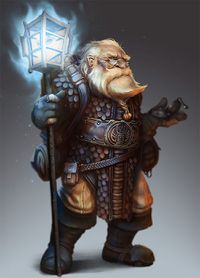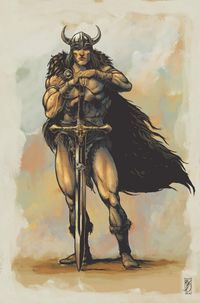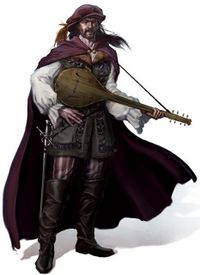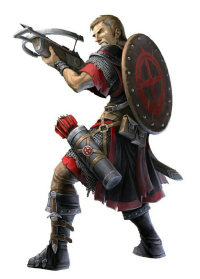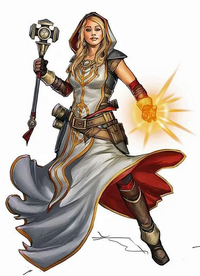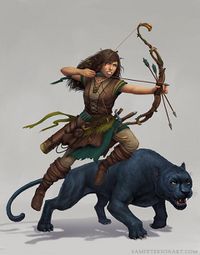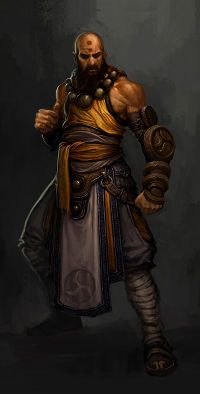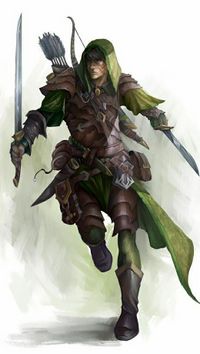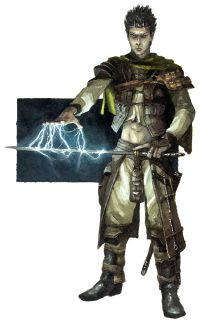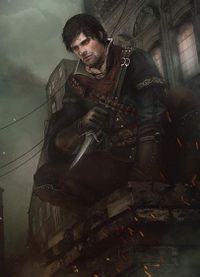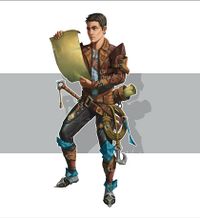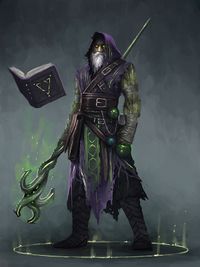Difference between revisions of "Savage Asmythe"
| (13 intermediate revisions by the same user not shown) | |||
| Line 90: | Line 90: | ||
===Skills=== | ===Skills=== | ||
Every character begins with the four common skills | Every character begins with the four common skills at d4. All other skills begin at 0 and new characters have 12 points to gain and improve skills; 1 point will improve a skill one die up to the linked attribute. Untrained skill tests, skill level 0, are made at d4-2. | ||
Common Skills | Common Skills | ||
| Line 114: | Line 114: | ||
* Science (smarts) - Knowledge of hard science such as engineering, chemistry, geology, physics, etc. | * Science (smarts) - Knowledge of hard science such as engineering, chemistry, geology, physics, etc. | ||
* Survival (smarts) - The knowledge and practice of wilderness survival: navigation, hunting and gathering, build camps and shelters, predicting weather, etc. | * Survival (smarts) - The knowledge and practice of wilderness survival: navigation, hunting and gathering, build camps and shelters, predicting weather, etc. | ||
* Thievery (agility) - Dishonest work: pickpocketing, lockpicking, and other kinds of | * Thievery (agility) - Dishonest work: pickpocketing, lockpicking, and other kinds of skullduggery. | ||
Combat Skills | Combat Skills | ||
| Line 135: | Line 135: | ||
* 3 points to have an arcane background. | * 3 points to have an arcane background. | ||
* 2 points can raise an attribute one die or | * 2 points can raise an attribute one die or gain an edge. | ||
* 1 point can improve a skill one die or gain additional starting equipment like a mount | * 1 point can improve a skill one die or gain additional starting equipment like a mount, better armor, additional weapons, etc. | ||
'''Hinderances from SWADE''' | '''Hinderances from SWADE''' | ||
| Line 263: | Line 263: | ||
==Supernatural Powers== | ==Supernatural Powers== | ||
Supernatural traits can be either arcane or primal. The page on [[Magic]] describes each in detail | Supernatural traits can be either arcane or primal. The page on [[Magic]] describes each in detail. | ||
===Power Points=== | ===Power Points=== | ||
Asmythe uses a | Asmythe uses a modification of the No Power Points rule from page 140. | ||
* Instead of using power points apply a | * Instead of using power points apply a modifier to the arcane skill roll, see below. | ||
* Success activates the power as usual. | * Success activates the power as usual. | ||
* A raise activates the power and grants an additional bonus if stated in the power description. | * A raise activates the power and grants an additional bonus if stated in the power description. | ||
* A failed roll causes a level of fatigue and the power does not activate. | * A failed roll causes a level of fatigue and the power does not activate. | ||
* A critical failure causes a level of fatigue and backlash: all non-instant powers end and the caster is shaken. | * A critical failure causes a level of fatigue and backlash: all non-instant powers end and the caster is shaken. | ||
Activation Roll Modifiers | |||
* All basic powers are activated with a standard roll, +0, regardless of the power point cost listed in the book. | |||
* All power modifiers apply a penalty to the roll equal to the total cost of all modifiers, as listed below and in each spell description. Modifiers listed below are already converted to a skill modifier, when using power modifiers listed in the book apply the power point cost as a direct penalty to the power activation roll. For example Barrier with the size (+1) modifier would apply a -1 to the power activation roll. | |||
===Backgrounds=== | ===Backgrounds=== | ||
When a power is | When a power is learned it has a trapping, a visual and material effect, associated with an element or dagapesh. | ||
'''Alchemy''' | '''Alchemy''' | ||
| Line 280: | Line 285: | ||
This is an arcane supernatural background common to delvers. Delver alchemy is the ability to alter the properties of inorganic material and to create elemental-powered devices. Alchemists almost never go on adventures, delver culture expects them to practice their science in their labs for the benefit of the delver stronghold. Delver alchemical science is the ability to alter materials by infusing them with elemental energy. These materials can be shaped and sculpted to create magical devices. | This is an arcane supernatural background common to delvers. Delver alchemy is the ability to alter the properties of inorganic material and to create elemental-powered devices. Alchemists almost never go on adventures, delver culture expects them to practice their science in their labs for the benefit of the delver stronghold. Delver alchemical science is the ability to alter materials by infusing them with elemental energy. These materials can be shaped and sculpted to create magical devices. | ||
* Starting Power: Fuse Elemental, see below. This must be performed inside an alchemical workshop but doesn't require a device. | * Starting Power: Fuse Elemental, see below. This must be performed inside an alchemical workshop but doesn't require a device. | ||
* Powers are Devices: Each power is expressed as a device | * Powers are Devices: When an alchemist learns new powers they are learning to create a new device to harness the power of elementals. Each power is expressed as a device and the alchemist can have only one device per power. If a device is destroyed it must be rebuilt. See the page on [[Enchanting#Delver_Alchemy|Delver Alchemy]] for details. All alchemists know the basics of alchemical imbuing and begin with that edge. | ||
* Elemental Choice: Each power must be associated with (have a trapping of) a specific element, but they can be different elements for each power. Alchemists are able to use any element but can not modify the trappings of a | * Elemental Choice: Each power must be associated with (have a trapping of) a specific element, but they can be different elements for each power. Alchemists are able to use any element for a power but can not modify the trappings of a power after it is selected. | ||
* | * Device Backlash: An alchemist doesn't suffer fatigue when a roll fails, instead the device malfunctions and must be repaired, which is the same as modifying the device. When a magic roll critically fails the alchemist is not shaken; instead the device is destroyed and must be recreated. | ||
'''Diva''' | '''Diva''' | ||
This is a primal supernatural background common to humans. Divas use | This is a primal supernatural background common to humans. Divas use music to affect mind and destiny of living creatures. Diva magic can not make any permanent physical changes in creatures or things but can heal and enhance creatures, imbue objects, and create artifacts. Each diva draws from a specific dagapesh for their power and their powers will manifest to reflect the emotions of that dagapesh. | ||
* Starting Power: Command, see below. | * Starting Power: Command, see below. | ||
* | * Dagapesh: Choose a dagapesh, all powers must have a trapping of that dagapesh. That means that every power will elicit an emotional response or reaction that is associated with that dagapesh. Each dagapesh has their own kind of sound associated with them, and translates into a specific musical instrument for divas. | ||
* Music is Power: To use powers a diva must be able to play their instrument loud enough that the dagapesh, and anybody near the diva, can hear it. The target of a power must be within range of the diva to be affected: meaning it would be able to hear the diva if it were capable of normal hearing. A power can target creatures the diva can not see, as long as the target can hear the diva's music. | |||
* Magic Resistance: A Diva's connection to the dagapesh gives them a connection to the flow of | * Magic Resistance: A Diva's connection to the dagapesh gives them a connection to the flow of destiny through Asmythe. This makes them resistant to undesirable changes; divas have a free reroll to resist primal magical effects. | ||
'''Druid''' | '''Druid''' | ||
This is a primal supernatural background common to sylvani. Druids protect and nurture the natural, living | This is a primal supernatural background common to sylvani. Druids protect and nurture the natural, living world of Asmythe. Through music and song druids can speak with animals and trees, reshape wood and bone, and manifest the will of the dagapesh into Asmythe. Druids do not align themselves with a specific dagapesh, they pledge to care for all the natural world. | ||
* Starting Power: Shape Wood, see below. | * Starting Power: Shape Wood, see below. | ||
* | * Rituals: Druids do not activate powers like most casters, instead they perform rituals. All druids are ritualists and begin with the Ritualist edge. Rituals are described below. | ||
* Nature Magic: Druids suffer - | * Nature Magic: Druids suffer -2 on activation rolls while in contact with any metal or mineral, including wearing or using any metal armor, weapons, or tools. | ||
'''Sorcery''' | '''Sorcery''' | ||
Sorcery is the specialization of magic common to hobgoblins. Hobgoblins learn magic as a natural ability | Sorcery is the specialization of magic common to hobgoblins. Hobgoblins learn magic as a natural ability; they know very few powers but use them very effectively. Hobgoblins can enchant and imbue objects but typically only do so for their own personal use. Sorcerers can learn arcane and primal powers and are not limited to specific elements or dagapesh, instead each power has a specific trapping (element or dagapesh) that never changes. Sorcerers can learn arcane edges if they have an arcane power and primal edges if they have a primal power. | ||
* Starting Powers: 1 | * Starting Powers: 1 | ||
* Words and Focus: Sorcery requires both loud vocalizations and a focusing device, regardless of the nature of the power. The focusing device is functionally the same as a wizard staff, see below, and hobgoblins often use weapons or tools for this purpose. | * Words and Focus: Sorcery requires *both* loud vocalizations and a focusing device for every power, regardless of the nature of the power. The focusing device is functionally the same as a wizard staff, see below, and hobgoblins often use weapons or tools for this purpose. Powers can not activate if the hobgoblin is silenced or muffled, like a diva, or if they don't have line of sight to the target, like a wizard.. | ||
* Favored Power: Sorcerers are experts at one specific power, they ignore two points of penalties when using their starting power. | * Favored Power: Sorcerers are experts at one specific power, they ignore two points of penalties when using their starting power. | ||
* Specialist: When a sorcerer takes the New Powers edge they get only one new power, which can be either arcane or primal. That power does not benefit from Favored Power. | * Specialist: When a sorcerer takes the New Powers edge they get only one new power, which can be either arcane or primal. That power does not benefit from Favored Power. The Prestige edge must be a combination with the starting power. | ||
| Line 317: | Line 321: | ||
Wild Magic is the untrained and undisciplined use of magic as a natural ability. Wild mages have a power they barely understand and can't always control. This background is intended to provide a supernatural power to characters who aren't specialized in using magic. For example, an archer could use wild magic to turn arrows into bolts of lightning, a monk could gain a power that makes them super strong, a ranger could animate plants to entangle enemies around them, a warrior could manifest a magical shield, a thief could walk on walls, etc. | Wild Magic is the untrained and undisciplined use of magic as a natural ability. Wild mages have a power they barely understand and can't always control. This background is intended to provide a supernatural power to characters who aren't specialized in using magic. For example, an archer could use wild magic to turn arrows into bolts of lightning, a monk could gain a power that makes them super strong, a ranger could animate plants to entangle enemies around them, a warrior could manifest a magical shield, a thief could walk on walls, etc. | ||
* | * Signature Power: Any one power, with a rank equal or less than the character's rank when this background is gained. | ||
* Starting Skill: Wild Magic, d4 | * Starting Skill: Wild Magic, d4 | ||
* | * Signature Move: Wild mages have a phrase, object, and action they use to activate their power. The phrase, object, and action don't need to be unique but must be of a specific category. This usually looks like a character saying their signature phrase while using an item, such as shouting "earthquake fist" while wearing a plate gauntlet and punching something. If they can not perform their signature move they can not use their power. | ||
* Untrained: The Wild Magic background can be taken only once and wild mages may only take | * Untrained: The Wild Magic background can be taken only once and wild mages may only take edges that enhance their one power. A wild magic power always has the same trappings and power modifiers, decided when the background is chosen. Wild magic is still either arcane or primal. Wild mages only ever know one specific power that works in one specific way. Wild magic is incompatible with other supernatural backgrounds. | ||
* Personal Magic: Wild magic powers always target the wild mage or have an effect emanating from the wild mage | * Personal Magic: Wild magic powers always target the wild mage or have an effect emanating from the wild mage. | ||
'''Wizardry''' | '''Wizardry''' | ||
This is an arcane supernatural background common to humans. Wizardry is the ability to | This is an arcane supernatural background common to humans. Wizardry is the ability to control elemental energy. Wizards learn to use ilthura science to cleanse and attune crystals to a specific elemental energy, set them in a staff, and then channel elemental energy through those crystals. This process is complex and dangerous so most wizards only learn how to harness a single element. The crystal can be made from any pure metal or gem at least an inch in the smallest dimension; each crystal can only be attuned to one element and each crystal represents a single power. | ||
* Starting Power: Elemental Manipulation. A wizard can | * Starting Power: Elemental Manipulation (Fantasy Companion pg124). A wizard can control elements and elemental energy, but can not create it. This power requires an attuned crystal ad is limited to the element(s) the wizard has mastered. | ||
* Elemental Specialty: Choose one primary element (fire/frost/air/stone), all powers must have a trapping of that element. This can be enhanced with edges. | * Elemental Specialty: Choose one primary element (fire/frost/air/stone), all powers must have a trapping of that element. This can be enhanced with edges. | ||
* Wizard Staff: Wizards must touch their wizard staff, set with crystals attuned to the appropriate | * Wizard Staff: Wizards must touch their wizard staff, set with crystals attuned to the appropriate element(s), to activate powers. The "staff" can be any device capable of holding elemental crystals. Powers appear to emanated from the crystals, as such both the wizard and the crystals must have line-of-sight to the target. | ||
* Exchangeable Powers: A wizard may attune or re-attune a crystal to a new power or with new trappings. The process requires an hour of concentration and is spectacular to watch as pure elemental energy is concentrated into the crystal. | * Exchangeable Powers: A wizard may attune or re-attune a crystal to a new power or with new trappings. The process requires an hour of concentration and is spectacular to watch as pure elemental energy is concentrated into the crystal. | ||
* | * Destructive Backlash: When a wizard suffers backlash, in addition to other effects, the gem attuned to that power shatters. The wizard loses access to that power until a new crystal can be attuned. | ||
===Powers=== | ===Powers=== | ||
Powers are listed in the core book, the SWADE Fantasy Companion, and the Tomes and Prayers expansion. All powers are available to every character as long as the trappings fit the nature of the magic | Powers are listed in the core book, the SWADE Fantasy Companion, and the Tomes and Prayers expansion. All powers are available to every character as long as the trappings fit the nature of the magic, arcane or primal, and don't violate the [[Magic#Limitations|rules of magic]]. | ||
Additional Powers | Additional Powers | ||
---- | ---- | ||
* Fuse Elemental (N, alchemy) - [1+, touch, instant] An alchemist fuses an elemental into an | * Fuse Elemental (N, alchemy) - [1+, touch, instant] An alchemist fuses an elemental into an in-organic object to change one of its properties. The object must be less than 3 feet in the largest dimension. For example an object could be made naturally warm, more dense, translucent, to glow dimly, or a myriad of other changes. This ability can not transmute objects, only alter them in some minor way: warm objects aren't hot enough to cook with, only vague shadows can be seen though a translucent object, glowing object provide barely enough light to read, etc. An elemental may also be infused into a mechanism, stabilizing that mechanism and preventing a rogue elemental from destroying it. | ||
* Command (N, Diva) - [1+, spirit, 1 minute, opposed by smarts] Divas | * Command (N, Diva) - [1+, spirit, 1 minute, opposed by smarts] Divas can use this ability to create a powerful desire in another creature for 1 minute or until satisfied. The command must be direct and simple, one or two words. Complex commands or commands that would result in self-harm give the target a bonus to resist. | ||
** Simple commands, "run", resist at +0. | |||
** Basic commands, "run to a tree", resist at +1. | |||
** Complex commands, "run to the tree with the red flag", resist at +2. | |||
** Commands that would cause self-harm are resisted at +4. | |||
** AREA EFFECT (+1/+2): The power affects all targets in a Medium Blast Template. For +2 this increases to a Large Blast Template. | |||
* Shape Wood (N, druid) - [1+, touch, instant] A druid can permanently change the shape of wood, bone, or any organic material not part of a living animal. The material can be shaped into any stable form and made more or less dense as long as the mass remains the same. With this power druids can shape a tree into a house and create tools and armor as strong as metal. The | * Shape Wood (N, druid) - [1+, touch, instant] A druid can permanently change the shape of wood, bone, or any organic material not part of a living animal. The material can be shaped into any stable form and made more or less dense as long as the mass remains the same. With this power druids can shape a tree into a house and create tools and armor as strong as metal. The difficulty modifier is +1 per meter in the largest dimension, after the first meter. Changing the density is another +1 difficulty. | ||
* Animate Golem (This replaces the Zombie power on page 170 and is the same except as noted.) - Golems can be any non-living construct with articulated joints. Creating and animating golems requires both arcane and primal magic working together, this can be one mage with both kinds of magic or multiple mages. Animate Golem must be cast as a ritual. This power is virtually unknown in the third age of Asmythe. | * Animate Golem (This replaces the Zombie power on page 170 and is the same except as noted.) - Golems can be any (currently) non-living construct with articulated joints. Creating and animating golems requires both arcane and primal magic working together, this can be one mage with both kinds of magic or multiple mages. Animate Golem must be cast as a ritual. This power is virtually unknown in the third age of Asmythe. | ||
===Trappings=== | ===Trappings=== | ||
Whenever a power is learned the effects of that power are chosen and remain the same every time that power is used. Arcane powers work by controlling | Whenever a power is learned the effects of that power are chosen and remain the same every time that power is used. Arcane powers work by controlling [[Magic#Elemental_Energy|elemental energy]] and select an elemental trapping for each power. Primal powers work by manipulating emotions and select an emotion associated with a dagapesh. | ||
===Power Backlash=== | ===Power Backlash=== | ||
Magic is inherently complex and difficult to control. Any time a magical skill roll fails the mage suffers a level of fatigue with an effect depending on the | Magic is inherently complex and difficult to control. Any time a magical skill roll fails the mage suffers a level of fatigue with an effect depending on the power and its trappings. A wizard is wracked as uncontrolled elemental energy surges through them; a diva's mind is filled with a cacophony of noise only they can hear. If the skill roll critically fails then the mage is also shaken and all non-instant powers and abilities end (excluding imbued items and enchantments). | ||
===Power Alterations=== | |||
Power alterations are modifiers that are linked to trappings, they are chosen when a power is learned and always modify the power. The alteration must make sense with the trappings. | |||
===Power Modifiers=== | ===Power Modifiers=== | ||
Power modifiers, if any, are selected when a power is activated and must make sense with the power trappings. Not all modifiers are available with all powers. The listed modifier affects the power activation roll. | |||
* Concentration (+0) - The duration of a non-instant power can be extended through mental focus. The mage must concentrate (spend a limited free action) every turn to maintain the power. If they become shaken or choose to stop concentrating then the power ends immediately, even if it would normally have a longer duration. | |||
* Ethereal (-1) - The power is intangible, but still visible, and can not be blocked by physical objects. Instead it is resisted by an appropriate attribute. Use piercing for powers with an attack roll. | |||
* Extended Range (-1) - Double the normal range for a power. A touch or personal power now has a range of Spirit. | |||
* Fatigue (-1) - The power drains or chills the target, causing one point of fatigue but will not incapacitate. If the power doesn't already have an attack or resistance roll this modifier grants a Vigor resistance roll; if resisted then all effects of the power are avoided. | |||
* Fiery/Frosty (+0) - anything affected by the power, or in the area of effect, may catch fire or freeze. | |||
* Glow/Shroud (-1) - Makes the target more or less noticeable either by manipulating light/sound or by illusion. Glow grants +1 to hit, -1 stealth and Shroud grants -1 to hit and +1 stealth. | |||
* Harmless (+1) - A power that does damage does no damage but may have other effects which may cause damage. For example, a Fire Bolt may be harmless so that it doesn't do direct damage but does catch something on fire and anybody standing in the fire may take damage. | |||
* Hinder/Hurry (-1) - Enhances or impairs the speed of the target in some way. Grant or reduce pace by 2. | |||
* Lingering Damage (-1) - A power that causes damage continues to cause damage, reducing the damage by one die each turn. For example, a lingering Fire Bolt that does 3d6 damage would do 2d6 damage the second turn and 1d6 on the third turn. | |||
* Personal (+1) - The ranged power now only affects the mage or somebody touched by the mage. | |||
* Piercing (-1) - The power is focused to defeat armor by piercing it or exploiting weak points. The power has 2 points of armor piercing or resistance is reduced by 1. | |||
* Repulsive (-1) - The power creates a pushing force. Anything affected by the power must resist with strength or be pushed one meter away from the mage. | |||
* Selective (-1) - When using a power with an area of effect, the mage can choose which targets in the area are affected. | |||
===Rituals=== | |||
A magical ritual involves one or more mages working together to activate a power. Rituals can use amplified modifiers to make them far more powerful but the large concentration of magic also attracts rogue elementals, magic-eating monsters, and possibly the direct attention of the dagapesh. Few survive a failed ritual. | |||
A ritual is a dramatic task coordinated by a single mage, who must have the Ritualist edge and know the power used in the ritual. The ritual requires a number of success tokens equal to the sum of all power modifiers in a number of turns equal to half the skill die of the lead ritualist. Only the lead ritualist can feel the approaching danger the ritual has attracted, and never accurately. | |||
Amplified Modifiers | |||
* All standard modifiers may be added multiple times, if applicable. | |||
* Increased Area (+2) - Increase the area of effect one step: self/touch -> small blast -> large blast -> large house (20m) -> castle (200m) -> city (2km). Each step adds +2. | |||
* Increased Duration (+2) - Increase the base duration one step: turns -> minutes -> hours -> days -> months -> years -> centuries. East step adds +2. | |||
* Increased Effect (+2) - For each +2, multiply the effect. For example, Boost Trait would increase the trait by 2 die types for +2, 3 for +4, etc. | |||
* Increased Range (+2) - Double the range for each +2. | |||
* Overpowering (+2) - Reduce the target's resistance by 2 for each +2 modifier. | |||
* Remote Effect (+2) - The ritual can affect a target the ritualist can't see if the ritual uses a magical anchor linked to the target person or place. This must usually be paired with Increased Range. | |||
* Fusion (+2) - +2 for each additional element or dagapesh used in the effect. | |||
===Supernatural Edges=== | ===Supernatural Edges=== | ||
| Line 360: | Line 400: | ||
* Drain Life (S, primal) - Drain the life from plants in a 3ft radius around you to recover a level of fatigue. | * Drain Life (S, primal) - Drain the life from plants in a 3ft radius around you to recover a level of fatigue. | ||
* Desecrate (H, primal) - Touch a dying creature and drain its life to recover all fatigue. This is a narrative action and can not cause any wounds. | * Desecrate (H, primal) - Touch a dying creature and drain its life to recover all fatigue. This is a narrative action and can not cause any wounds. | ||
* Elemental Adept (N, wizard) - You master another primary element or an outer element and may create powers based on that element. This can be taken multiple times. | * Elemental Adept (N, wizard) - You master another primary element or an outer element and may create powers based on that element. You may also control that element with Elemental Manipulation. This can be taken multiple times. | ||
* Elemental Master (N, wizard) - As a wizard you learn to master minor elements adjacent to your primary element(s). You can create powers based on these minor elements. | * Elemental Master (N, wizard) - As a wizard you learn to master minor elements adjacent to your primary element(s). You can create powers based on these minor elements and control them with Elemental Manipulation. | ||
* Enchanting (S, Imbuing) - Enables the mage to create magical devices with multiple uses: wands, clothing, jewelry, etc. See [[Enchanting]] for details. | * Enchanting (S, Imbuing) - Enables the mage to create magical devices with multiple uses: wands, clothing, jewelry, etc. See [[Enchanting]] for details. | ||
* Epic Mastery (V, d6+) - Gain access to epic power modifiers. (Fantasy Companion pg. 36) | * Epic Mastery (V, d6+) - Gain access to epic power modifiers. (Fantasy Companion pg. 36) | ||
* Familiar (N, druid) - Druids can form a mutual bond with a wild animal, turning it into a familiar. (Fantasy Companion pg. 36) | * Familiar (N, druid) - Druids can form a mutual bond with a wild animal, turning it into a familiar. (Fantasy Companion pg. 36) | ||
* Favored Power ( | * Favored Element (S, d6+, arcane) - Choose an element you already know, all powers that use that element as a trapping ignore one point of penalties from power modifiers. This can be taken once per rank. | ||
* Imbuing (N) - Enables a mage to imbue single-use items with a power anybody can use. These are potions, scrolls, magic arrows, etc. A mage may have a number of imbued objects equal to | * Favored Power (S, d8+) - Choose a power, ignore two points of any penalty when using that power. This applies to all penalties such as multi-action penalties, wounds, fatigue, distraction, and including the penalty for modifiers. This may be taken once per rank. (Fantasy Companion pg. 36) | ||
* Imbuing (N) - Enables a mage to imbue single-use items with a power anybody can use. These are potions, scrolls, magic arrows, etc. A mage may have a number of imbued objects equal to their skill die. Imbuing is described in Wizards and Mystics on page 14, see [[Enchanting]] for details. | |||
* Improved Wild Magic (S, wild magic) - You have learned greater control over your magic, you get a free reroll when activating your power. | * Improved Wild Magic (S, wild magic) - You have learned greater control over your magic, you get a free reroll when activating your power. | ||
* | * Singing (N, diva) - A diva who has learned to sing in addition to playing an instrument ignores two points of penalty from power modifiers when using both. They may also sing instead of playing an instrument, with no modifiers. | ||
* Master Enchanter (V, Enchanting) - You may create one additional enchanted object. This can be taken multiple times. | * Master Enchanter (V, Enchanting) - You may create one additional enchanted object. This can be taken multiple times. | ||
* Master | * Master Imbuing (S, Imbuing) - You may create an additional (skill die) imbued objects. This can be taken multiple times. | ||
* Natural Power (S, sorcery or wild magic) - A sorcerer has learned to activate their | * Master Ritualist (V, Ritualist) - All other participants in the ritual get +1 to their rolls. | ||
* Natural Power (S, sorcery or wild magic) - A sorcerer or wild mage has learned to activate their signature power without words and gestures. It can be activated when silenced and/or bound but still requires the focus object. | |||
* New Powers (N) - Learn two new powers. This can be taken multiple times. | * New Powers (N) - Learn two new powers. This can be taken multiple times. | ||
* Prestige (S) - Learn a new power which is a combination of two powers that can only be used together as a single power. Use the higher duration, casting time, range, etc. of each individual power. This can be taken multiple times. | * Prestige (S) - Learn a new power which is a combination of two powers that can only be used together as a single power. Use the higher duration, casting time, range, etc. of each individual power. This can be taken multiple times. | ||
* Ritualist (N) - You are able to coordinate the magical energy of other mages, allowing you to lead a ritual. | |||
==Character Archetypes == | ==Character Archetypes == | ||
Latest revision as of 13:56, 16 October 2023
Savage Worlds is a system from Pinnacle Entertainment. It is ideal for a lore heavy, narrative friendly world like Asmythe.
Any references to page numbers refer to the Savage Worlds Adventure Edition core book unless otherwise noted.
Characters
Savage Worlds character creation is designed to support archetypes, which are idealized character styles popularized by books, movies, and other kinds of fiction. For example, a sylvan druid with animal companions, a human paladin fighting for great good, a delver engineer, a mysterious wizard, a tough barbarian, and many many more.
Decide what kind of character you want to play and the information below should help you create that character. At the bottom of this page is a list of sample archetypes and character builds.
A baseline character is assumed to be a human child of a large and moderately wealthy household. They have too many siblings, or they are an illegitimate child, and have no hope of inheriting any wealth. They are given a very small grant from their family and sent away to make something of themselves. Most people in this position join an organization such as the Soldiers of Asmythe.
Recommended Character Creation Process
- First get a piece of scratch paper and use this to make notes during this process.
- Decide on a character concept and archetype. What kind of character do you want to play?
- Choose a race for your character that fits your concept.
- What is your character background; how do they function in society?
- What attachments or obligations do you have to family, guild, or lord?
- What ideals does your character have that helps them decide right from wrong?
- Character flaws are quirks and shortcoming that give your character depth and personality.
- Review the list of skills and choose a 4-8 that are important to your character concept. Looking at the linked attribute for these skills, which attributes look like they are the most important?
- Allocate attribute points according to your character concept and skills from above. You
- Choose skills and allocate points. You should have 5-10 skills with at least a d6 in your most important skills. Note that skills may not be higher than the linked attribute.
- Make your character interesting by selecting 4 points in hinderances. Use these points to gain edges and/or improve attributes. If your character uses magic you must gain the appropriate supernatural background edge, see #Supernatural Backgrounds below.
- All characters begin with basic adventuring gear (see below). If you want any additional gear now is the time to talk to your GM about it.
- Copy everything to your character sheet.
Ancestries
These are the most common species ancestries in Asmythe. Each individual is different but there are some cultural similarities that are common. These are listed as suggested hinderances and are considered quirks: "minor but persistent behavior that often annoys others."
In the third age all races are considered outsiders to each other and subtract 2 from persuasion roles when dealing with other species.
Humans
Humans are the most common player race and form the baseline for used for other races. They are more sociable and adaptable than other races.
- Adaptable: Begin with a free novice edge of your choice.
Suggested Hinderances
- Selfish (Minor) - Humans think of themselves first and most and often make decisions without regard to how it will affect others.
- Curious (Minor) - Humans like to learn and try new things, even when doing so is dangerous.
- Industrious (Minor) - Humans like to build things and solve problems head-on. Why go around a mountain when you can build a tunnel?
Sylvani
Sylvani are smaller than humans and spend their lives in natural surroundings. They are nomadic, stealthy, and fierce. Sylvani have a natural tendency toward primal magic.
- Attribute Increase: Spirit begins at d6.
- Sleep Reduction: Sylvani require only 4 hours of sleep per day.
- All Thumbs: Sylvani are creatures of nature; -2 to all tests to use or understand mechanical or elemental devices.
Suggested Hinderances
- Natural (Minor) - Sylvani do no use any metal or stone tools and find such things repugnant.
- Jaded (Minor) - Death is part of life and Sylvani don't seem to care when things die, as long as the cycle is healthy.
- Artistic (Minor) - Everything a Sylvani does is carefully crafted to be beautiful in form and function.
Delvers
Delvers are short and stout and spend most of their lives in large mountain strongholds. They have access to alchemy magic.
- Attribute Increase: Vigor begins at d6
- Low Light Vision: Ignore penalties for dim or dark surroundings, but not for total darkness.
- Reduced Pace: Pace is -1 and running is reduced by one die.
Suggested Hinderances
- Loyal (Minor) - Delvers always side with Delvers and in any decision will make the choice most likely to benefit Delvers.
- Patient (Minor) - There is no reason to hurry or take shortcuts, the destination will come eventually and with enough effort.
- Goldlust (Minor) - Delvers love shiny things and will go to great effort to collect and display them.
Goblinoids
The goblin species consists of three sub-races: goblins, orcs, and hobgoblins.
- Goblins are laborers and crafters. Agility starts at d6
- Orcs are warriors and hunters. Strength starts at d6
- Hobgoblins are strategists and politicians. Smarts start at d6
Suggested Hinderances
- Lawful (Minor) - Goblin laws are harsh and absolute; only weaker cultures allow criminals to live. Cheating is a capital crime.
- Brutal (Minor) - Fighting is how goblins greet and bond with each other.
- Racist (Minor) - Goblins are better than everybody else, just because they are.
Traits
Traits are rated on the dice scale: 0, d4, d6, d8, d10, d12
Attributes
All begin at d4 and new characters have 5 points to raise attributes, one die type per point with a maximum of d12.
- Agility - Dexterity, coordination, reflexes
- Smarts - Intellect, perception, logic
- Spirit - Willpower, mental fortitude, charisma
- Strength - Physical fitness, muscle strength
- Vigor - Endurance, health, constitution
Skills
Every character begins with the four common skills at d4. All other skills begin at 0 and new characters have 12 points to gain and improve skills; 1 point will improve a skill one die up to the linked attribute. Untrained skill tests, skill level 0, are made at d4-2.
Common Skills
- Athletics (strength) - Physical strength and coordination: climbing, jumping, swimming, and most other physical activities.
- Common Knowledge (smarts) - Local knowledge, local history, local geography, local politics, etc. Anything a typical resident could know.
- Notice (smarts) - The ability to perceive something out of place, somebody sneaking, or otherwise unexpected. Also use this skill to recognize that something not-obvious and non-hidden is significant.
- Persuasion (spirit) - The ability to convince others to agree to do or say something willingly through negotiation, politics, or deception.
- Stealth (agility) - Move silently, hide, camouflage, and other sneaking stealthy things.
General Skills
- Academics (smarts) - Knowledge of culture, history, language, etc. Higher education and general knowledge that doesn't rise to the level of "science".
- Animals (spirit) - Handling tame and wild animals. Training them, riding them, sensing their needs or intentions, etc.
- Battle (smarts) - Tactical and strategic planning for ambushes, large battles, siege warfare, etc.
- Boating (agility) - The knowledge and ability to handle a boat or ship, on the sea or air.
- Gambling (smarts) - Winning bets and games of skill or chance.
- Healing (smarts) - Identify ailments, craft and apply healing ointments, set splints, cure poison, etc. Use this skill to deal with any non-magical physical damage or affliction.
- Intimidation (spirit) - Using insults, taunts, threats, and aggressive language to coerce another person to do or say something they don't want to do.
- Investigation (smarts) - Research and logical thinking, used to follow a trail of clues or solve puzzles. Use this skill any time the book references "Research" but it is also used for social and situational investigations.
- Occult (smarts) - Knowledge of the cosmology, primal dagapesh, the ilthura, elementals, etc. Use this skill to decipher runes, recognize magical effects, and identify curses.
- Performance (spirit) - Performing for an audience: acting, singing, dancing, playing an instrument, etc.
- Science (smarts) - Knowledge of hard science such as engineering, chemistry, geology, physics, etc.
- Survival (smarts) - The knowledge and practice of wilderness survival: navigation, hunting and gathering, build camps and shelters, predicting weather, etc.
- Thievery (agility) - Dishonest work: pickpocketing, lockpicking, and other kinds of skullduggery.
Combat Skills
- Shooting (agility) - Attack with any ranged weapon such as bows, crossbows, bolos, and thrown weapons.
- Fighting (agility) - Attack and defense in close quarters using any kind of weapon, improvised weapon, or martial arts.
Magic Skills
Requires the appropriate Supernatural Background.
- Alchemy (smarts) - Delver arcane magic is the skill of altering the properties of materials.
- Diva (spirit) - Human primal magic affects thoughts and emotions and, to a lesser extend, living humans.
- Druid (spirit) - Sylvan primal magic is the skill of creating potions and salves and changing the shape of nature.
- Sorcery (sprit/smarts) - Hobgoblin magic focuses on the mastery of a single power. Primal sorcery uses spirit, arcane sorcery uses smarts.
- Wild Magic (spirit/smarts) - Wild Magic is magic that manifests as a natural ability of the character. If the magic is primal use spirit, if it is arcane use smarts.
- Wizardry (smarts) - Human arcane magic used to summon and control elementals.
Hindrances
You may and should take up to 5 points in hinderances. Roleplaying hinderances is a powerful way to get extra bennies; you should have one hinderance that directly affects traits and the remaining points in personality and role-playing hinderances. Consider your attachments, ideals, and flaws and how you can represent those as hinderances.
- 3 points to have an arcane background.
- 2 points can raise an attribute one die or gain an edge.
- 1 point can improve a skill one die or gain additional starting equipment like a mount, better armor, additional weapons, etc.
Hinderances from SWADE
Most hinderances from Savage World Adventure Edition, SWADE, are allowed if they fit the game (GM approval). They are too numerous to list here.
Hinderances from Fantasy Companion
- Amorous (minor) - penalty to resist tests from attractive characters
- Arcane Sensitivity (minor/major) - penalty to resist the effects of magic
- Blunderer (major) - more critical failures when using an important skill
- Doomed (major) - penalty to soak rolls
- Idealistic (minor) - see the world in black and white, strictly follow the law or a moral code
- Jingoistic (minor/major) - racist; penalty when dealing with other races
- Selfless (minor/major) - always take action to benefit others before yourself
Edges
Characters get edges from Hinderance points or from advances.
Edges from SWADE
Most edges from the SWADE book are allowed if they fit the game (GM approval). They are too numerous to list here.
Edges from Fantasy Companion
Many edges from the Fantasy Companion are unbalanced or not thematically appropriate to Asmythe. These are the ones allowed.
Background Edges
- Heirloom - begin the game with a powerful artifact
Combat Edges
- Charge - run at an opponent for bonus damage
- Close Fighting (N, +) - gain a bonus when using a small weapon against an opponent with a large weapon.
- Defender - use a shield to protect allies
- Dirty Fighter (S) - improved fighting tests
- Really Dirty Fighter (S) - gain The Drop with a raise on a fighting test
- Double Shot (S, +) - shoot/throw two projectiles as one action, once per turn.
- Improved Double Shot (H, +) - shoot/throw two projectiles as one action, twice per turn.
- Formation Fighter (N, +) - improved Gang Up bonus
- Missile Deflection (H, +) - use parry against projectiles
- Sneak Attack (S, +) - improved sneak attack damage
- Improved Sneak Attack (V, +) - can sneak attack distracted opponents
- Take the Hit (S, +) - better soak rolls
- Trademark Weapon - Bonus only applies to main hand weapon, even with ambidexterity.
- Uncanny reflexes (V, +) - better ability to evade area effects
Professional Edges
- Born in the Saddle (N, +) - bonus on riding rolls, increased mount speed
- Troubadour (S, +) - bonus to common knowledge
Wealth
Asmythe uses an abstract wealth system, removing the need to count coins and inventory your inventory. This system assumes that characters have easy access to their wealth or are able to issue IOUs that will be honored by the Tridale Trade Company or local oligarch.
We also don't keep track of expendable items such as arrows, bolts, torches, rations, etc. But a critical failure or dramatic conditions could indicate that supplies have run out.
Wealth is a trait that ranges from 0 to d12, just like other traits. Most characters start with basic adventuring gear and d6 wealth, which is enough to have residence at a local inn or a room in a shared residence. Wealth tests use the wild die just like any other trait test.
Each level of wealth has two values, pocket and limit, that determine what purchases can be made. Any purchases less than pocket value can be made without a wealth check; the cost is too small to note. Any purchase above the limit is too expensive, the character can't afford this purchase without selling investments. A purchase that is more than pocket and less than limit, requires a wealth test. Sum all purchases in a short amount of time, usually a day or two, to find the total value of the shopping trip and use this value to determine if a wealth test is necessary.
| Wealth | Description | Pocket Value | Purchase Limit |
|---|---|---|---|
| 0 | Beggar | $0 | $10 |
| d4 | Laborer | $10 | $100 |
| d6 | Commoner | $50 | $500 |
| d8 | Freeman | $150 | $2000 |
| d10 | Lord | $450 | $5000 |
| d12 | Noble | $1000 | $10,000 |
Wealth tests are modified by the quality and rarity of the purchase and the prosperity of the local economy. These modifiers stack.
- A success means the purchase can be made, but it will use significant resources and reduces the wealth trait one level. If wealth would be reduced below 0 then the purchase can't be made.
- A raise means the purchase can be made without reducing wealth.
- A failure means the purchase isn't possible. The item can't be found or you can't afford it.
Purchasing Modifiers
| Economy | Quality | Rarity | Modifier |
|---|---|---|---|
| City | Low | Very Common | +1 |
| Town | Standard | Common | +0 |
| Village | High | Rare | -1 |
Whenever you gain a financial reward, such as from an adventure or bounty, you may either spend it on a shopping spree or increase your wealth, but not both.
- Shopping spree: Spend some or all of the reward on purchases. Any remaining after the shopping spree becomes part of your wealth without affecting the trait.
- Increase Wealth: Deposit cash in the bank and buy investments. Wealth becomes the highest level that has a limit less than the reward. Increasing wealth does not confer any property or title, as you would get from edges.
For example, after defeating Bullnose Bill and his band of ruffians the pair of adventurers each receive a reward worth $1000. Tom recently purchased a new set of armor and his current wealth is a d4; he chooses to use all of his reward to increase his wealth level back up to d6 ($1000 < $2000). Terry already has d6 wealth and goes on a shopping spree, she spends $750 and the remaining $250 becomes part of her existing d6 wealth.
Edges and Hinderances
- Poverty - wealth is d4 and the character lives day-to-day. They often sleep in the gutter, stables, or at a boarding house.
- Rich - increase wealth to d8 and the character has a house, a small farm, a small shop, or similar.
- Filthy Rich - increase wealth to d10 and the character has a small estate, trading house, noble title, or similar.
Equipment
Characters begin with basic adventure gear and d6 wealth.
Basic Adventure Gear
- Backpack
- Bedroll: wool blanket wrapped in a waxed canvas tarp
- Casual clothes
- Mess kit: cup, cutlery, field knife
- Tinderbox
- Torches
- Travel boots and cloak
- Travel rations
- Twine
- Water canteen
- One weapon (sword, staff, axe, mace, bow, etc.)
- A light leather coat (armor +1).
- Appropriate professional gear such as a wizard's device, holy symbol, lockpicks, etc. (subject to GM review)
Supernatural Powers
Supernatural traits can be either arcane or primal. The page on Magic describes each in detail.
Power Points
Asmythe uses a modification of the No Power Points rule from page 140.
- Instead of using power points apply a modifier to the arcane skill roll, see below.
- Success activates the power as usual.
- A raise activates the power and grants an additional bonus if stated in the power description.
- A failed roll causes a level of fatigue and the power does not activate.
- A critical failure causes a level of fatigue and backlash: all non-instant powers end and the caster is shaken.
Activation Roll Modifiers
- All basic powers are activated with a standard roll, +0, regardless of the power point cost listed in the book.
- All power modifiers apply a penalty to the roll equal to the total cost of all modifiers, as listed below and in each spell description. Modifiers listed below are already converted to a skill modifier, when using power modifiers listed in the book apply the power point cost as a direct penalty to the power activation roll. For example Barrier with the size (+1) modifier would apply a -1 to the power activation roll.
Backgrounds
When a power is learned it has a trapping, a visual and material effect, associated with an element or dagapesh.
Alchemy
This is an arcane supernatural background common to delvers. Delver alchemy is the ability to alter the properties of inorganic material and to create elemental-powered devices. Alchemists almost never go on adventures, delver culture expects them to practice their science in their labs for the benefit of the delver stronghold. Delver alchemical science is the ability to alter materials by infusing them with elemental energy. These materials can be shaped and sculpted to create magical devices.
- Starting Power: Fuse Elemental, see below. This must be performed inside an alchemical workshop but doesn't require a device.
- Powers are Devices: When an alchemist learns new powers they are learning to create a new device to harness the power of elementals. Each power is expressed as a device and the alchemist can have only one device per power. If a device is destroyed it must be rebuilt. See the page on Delver Alchemy for details. All alchemists know the basics of alchemical imbuing and begin with that edge.
- Elemental Choice: Each power must be associated with (have a trapping of) a specific element, but they can be different elements for each power. Alchemists are able to use any element for a power but can not modify the trappings of a power after it is selected.
- Device Backlash: An alchemist doesn't suffer fatigue when a roll fails, instead the device malfunctions and must be repaired, which is the same as modifying the device. When a magic roll critically fails the alchemist is not shaken; instead the device is destroyed and must be recreated.
Diva
This is a primal supernatural background common to humans. Divas use music to affect mind and destiny of living creatures. Diva magic can not make any permanent physical changes in creatures or things but can heal and enhance creatures, imbue objects, and create artifacts. Each diva draws from a specific dagapesh for their power and their powers will manifest to reflect the emotions of that dagapesh.
- Starting Power: Command, see below.
- Dagapesh: Choose a dagapesh, all powers must have a trapping of that dagapesh. That means that every power will elicit an emotional response or reaction that is associated with that dagapesh. Each dagapesh has their own kind of sound associated with them, and translates into a specific musical instrument for divas.
- Music is Power: To use powers a diva must be able to play their instrument loud enough that the dagapesh, and anybody near the diva, can hear it. The target of a power must be within range of the diva to be affected: meaning it would be able to hear the diva if it were capable of normal hearing. A power can target creatures the diva can not see, as long as the target can hear the diva's music.
- Magic Resistance: A Diva's connection to the dagapesh gives them a connection to the flow of destiny through Asmythe. This makes them resistant to undesirable changes; divas have a free reroll to resist primal magical effects.
Druid
This is a primal supernatural background common to sylvani. Druids protect and nurture the natural, living world of Asmythe. Through music and song druids can speak with animals and trees, reshape wood and bone, and manifest the will of the dagapesh into Asmythe. Druids do not align themselves with a specific dagapesh, they pledge to care for all the natural world.
- Starting Power: Shape Wood, see below.
- Rituals: Druids do not activate powers like most casters, instead they perform rituals. All druids are ritualists and begin with the Ritualist edge. Rituals are described below.
- Nature Magic: Druids suffer -2 on activation rolls while in contact with any metal or mineral, including wearing or using any metal armor, weapons, or tools.
Sorcery
Sorcery is the specialization of magic common to hobgoblins. Hobgoblins learn magic as a natural ability; they know very few powers but use them very effectively. Hobgoblins can enchant and imbue objects but typically only do so for their own personal use. Sorcerers can learn arcane and primal powers and are not limited to specific elements or dagapesh, instead each power has a specific trapping (element or dagapesh) that never changes. Sorcerers can learn arcane edges if they have an arcane power and primal edges if they have a primal power.
- Starting Powers: 1
- Words and Focus: Sorcery requires *both* loud vocalizations and a focusing device for every power, regardless of the nature of the power. The focusing device is functionally the same as a wizard staff, see below, and hobgoblins often use weapons or tools for this purpose. Powers can not activate if the hobgoblin is silenced or muffled, like a diva, or if they don't have line of sight to the target, like a wizard..
- Favored Power: Sorcerers are experts at one specific power, they ignore two points of penalties when using their starting power.
- Specialist: When a sorcerer takes the New Powers edge they get only one new power, which can be either arcane or primal. That power does not benefit from Favored Power. The Prestige edge must be a combination with the starting power.
Wild Magic
Wild Magic is the untrained and undisciplined use of magic as a natural ability. Wild mages have a power they barely understand and can't always control. This background is intended to provide a supernatural power to characters who aren't specialized in using magic. For example, an archer could use wild magic to turn arrows into bolts of lightning, a monk could gain a power that makes them super strong, a ranger could animate plants to entangle enemies around them, a warrior could manifest a magical shield, a thief could walk on walls, etc.
- Signature Power: Any one power, with a rank equal or less than the character's rank when this background is gained.
- Starting Skill: Wild Magic, d4
- Signature Move: Wild mages have a phrase, object, and action they use to activate their power. The phrase, object, and action don't need to be unique but must be of a specific category. This usually looks like a character saying their signature phrase while using an item, such as shouting "earthquake fist" while wearing a plate gauntlet and punching something. If they can not perform their signature move they can not use their power.
- Untrained: The Wild Magic background can be taken only once and wild mages may only take edges that enhance their one power. A wild magic power always has the same trappings and power modifiers, decided when the background is chosen. Wild magic is still either arcane or primal. Wild mages only ever know one specific power that works in one specific way. Wild magic is incompatible with other supernatural backgrounds.
- Personal Magic: Wild magic powers always target the wild mage or have an effect emanating from the wild mage.
Wizardry
This is an arcane supernatural background common to humans. Wizardry is the ability to control elemental energy. Wizards learn to use ilthura science to cleanse and attune crystals to a specific elemental energy, set them in a staff, and then channel elemental energy through those crystals. This process is complex and dangerous so most wizards only learn how to harness a single element. The crystal can be made from any pure metal or gem at least an inch in the smallest dimension; each crystal can only be attuned to one element and each crystal represents a single power.
- Starting Power: Elemental Manipulation (Fantasy Companion pg124). A wizard can control elements and elemental energy, but can not create it. This power requires an attuned crystal ad is limited to the element(s) the wizard has mastered.
- Elemental Specialty: Choose one primary element (fire/frost/air/stone), all powers must have a trapping of that element. This can be enhanced with edges.
- Wizard Staff: Wizards must touch their wizard staff, set with crystals attuned to the appropriate element(s), to activate powers. The "staff" can be any device capable of holding elemental crystals. Powers appear to emanated from the crystals, as such both the wizard and the crystals must have line-of-sight to the target.
- Exchangeable Powers: A wizard may attune or re-attune a crystal to a new power or with new trappings. The process requires an hour of concentration and is spectacular to watch as pure elemental energy is concentrated into the crystal.
- Destructive Backlash: When a wizard suffers backlash, in addition to other effects, the gem attuned to that power shatters. The wizard loses access to that power until a new crystal can be attuned.
Powers
Powers are listed in the core book, the SWADE Fantasy Companion, and the Tomes and Prayers expansion. All powers are available to every character as long as the trappings fit the nature of the magic, arcane or primal, and don't violate the rules of magic.
Additional Powers
- Fuse Elemental (N, alchemy) - [1+, touch, instant] An alchemist fuses an elemental into an in-organic object to change one of its properties. The object must be less than 3 feet in the largest dimension. For example an object could be made naturally warm, more dense, translucent, to glow dimly, or a myriad of other changes. This ability can not transmute objects, only alter them in some minor way: warm objects aren't hot enough to cook with, only vague shadows can be seen though a translucent object, glowing object provide barely enough light to read, etc. An elemental may also be infused into a mechanism, stabilizing that mechanism and preventing a rogue elemental from destroying it.
- Command (N, Diva) - [1+, spirit, 1 minute, opposed by smarts] Divas can use this ability to create a powerful desire in another creature for 1 minute or until satisfied. The command must be direct and simple, one or two words. Complex commands or commands that would result in self-harm give the target a bonus to resist.
- Simple commands, "run", resist at +0.
- Basic commands, "run to a tree", resist at +1.
- Complex commands, "run to the tree with the red flag", resist at +2.
- Commands that would cause self-harm are resisted at +4.
- AREA EFFECT (+1/+2): The power affects all targets in a Medium Blast Template. For +2 this increases to a Large Blast Template.
- Shape Wood (N, druid) - [1+, touch, instant] A druid can permanently change the shape of wood, bone, or any organic material not part of a living animal. The material can be shaped into any stable form and made more or less dense as long as the mass remains the same. With this power druids can shape a tree into a house and create tools and armor as strong as metal. The difficulty modifier is +1 per meter in the largest dimension, after the first meter. Changing the density is another +1 difficulty.
- Animate Golem (This replaces the Zombie power on page 170 and is the same except as noted.) - Golems can be any (currently) non-living construct with articulated joints. Creating and animating golems requires both arcane and primal magic working together, this can be one mage with both kinds of magic or multiple mages. Animate Golem must be cast as a ritual. This power is virtually unknown in the third age of Asmythe.
Trappings
Whenever a power is learned the effects of that power are chosen and remain the same every time that power is used. Arcane powers work by controlling elemental energy and select an elemental trapping for each power. Primal powers work by manipulating emotions and select an emotion associated with a dagapesh.
Power Backlash
Magic is inherently complex and difficult to control. Any time a magical skill roll fails the mage suffers a level of fatigue with an effect depending on the power and its trappings. A wizard is wracked as uncontrolled elemental energy surges through them; a diva's mind is filled with a cacophony of noise only they can hear. If the skill roll critically fails then the mage is also shaken and all non-instant powers and abilities end (excluding imbued items and enchantments).
Power Alterations
Power alterations are modifiers that are linked to trappings, they are chosen when a power is learned and always modify the power. The alteration must make sense with the trappings.
Power Modifiers
Power modifiers, if any, are selected when a power is activated and must make sense with the power trappings. Not all modifiers are available with all powers. The listed modifier affects the power activation roll.
- Concentration (+0) - The duration of a non-instant power can be extended through mental focus. The mage must concentrate (spend a limited free action) every turn to maintain the power. If they become shaken or choose to stop concentrating then the power ends immediately, even if it would normally have a longer duration.
- Ethereal (-1) - The power is intangible, but still visible, and can not be blocked by physical objects. Instead it is resisted by an appropriate attribute. Use piercing for powers with an attack roll.
- Extended Range (-1) - Double the normal range for a power. A touch or personal power now has a range of Spirit.
- Fatigue (-1) - The power drains or chills the target, causing one point of fatigue but will not incapacitate. If the power doesn't already have an attack or resistance roll this modifier grants a Vigor resistance roll; if resisted then all effects of the power are avoided.
- Fiery/Frosty (+0) - anything affected by the power, or in the area of effect, may catch fire or freeze.
- Glow/Shroud (-1) - Makes the target more or less noticeable either by manipulating light/sound or by illusion. Glow grants +1 to hit, -1 stealth and Shroud grants -1 to hit and +1 stealth.
- Harmless (+1) - A power that does damage does no damage but may have other effects which may cause damage. For example, a Fire Bolt may be harmless so that it doesn't do direct damage but does catch something on fire and anybody standing in the fire may take damage.
- Hinder/Hurry (-1) - Enhances or impairs the speed of the target in some way. Grant or reduce pace by 2.
- Lingering Damage (-1) - A power that causes damage continues to cause damage, reducing the damage by one die each turn. For example, a lingering Fire Bolt that does 3d6 damage would do 2d6 damage the second turn and 1d6 on the third turn.
- Personal (+1) - The ranged power now only affects the mage or somebody touched by the mage.
- Piercing (-1) - The power is focused to defeat armor by piercing it or exploiting weak points. The power has 2 points of armor piercing or resistance is reduced by 1.
- Repulsive (-1) - The power creates a pushing force. Anything affected by the power must resist with strength or be pushed one meter away from the mage.
- Selective (-1) - When using a power with an area of effect, the mage can choose which targets in the area are affected.
Rituals
A magical ritual involves one or more mages working together to activate a power. Rituals can use amplified modifiers to make them far more powerful but the large concentration of magic also attracts rogue elementals, magic-eating monsters, and possibly the direct attention of the dagapesh. Few survive a failed ritual.
A ritual is a dramatic task coordinated by a single mage, who must have the Ritualist edge and know the power used in the ritual. The ritual requires a number of success tokens equal to the sum of all power modifiers in a number of turns equal to half the skill die of the lead ritualist. Only the lead ritualist can feel the approaching danger the ritual has attracted, and never accurately.
Amplified Modifiers
- All standard modifiers may be added multiple times, if applicable.
- Increased Area (+2) - Increase the area of effect one step: self/touch -> small blast -> large blast -> large house (20m) -> castle (200m) -> city (2km). Each step adds +2.
- Increased Duration (+2) - Increase the base duration one step: turns -> minutes -> hours -> days -> months -> years -> centuries. East step adds +2.
- Increased Effect (+2) - For each +2, multiply the effect. For example, Boost Trait would increase the trait by 2 die types for +2, 3 for +4, etc.
- Increased Range (+2) - Double the range for each +2.
- Overpowering (+2) - Reduce the target's resistance by 2 for each +2 modifier.
- Remote Effect (+2) - The ritual can affect a target the ritualist can't see if the ritual uses a magical anchor linked to the target person or place. This must usually be paired with Increased Range.
- Fusion (+2) - +2 for each additional element or dagapesh used in the effect.
Supernatural Edges
This list replaces those in the core book. Requirements are in parentheses; all require a supernatural background.
- Artificer (V, Enchanting) - Enables the mage to create permanent magical objects. These major magical devices are very powerful and difficult to create, see Enchanting for details.
- Drain Life (S, primal) - Drain the life from plants in a 3ft radius around you to recover a level of fatigue.
- Desecrate (H, primal) - Touch a dying creature and drain its life to recover all fatigue. This is a narrative action and can not cause any wounds.
- Elemental Adept (N, wizard) - You master another primary element or an outer element and may create powers based on that element. You may also control that element with Elemental Manipulation. This can be taken multiple times.
- Elemental Master (N, wizard) - As a wizard you learn to master minor elements adjacent to your primary element(s). You can create powers based on these minor elements and control them with Elemental Manipulation.
- Enchanting (S, Imbuing) - Enables the mage to create magical devices with multiple uses: wands, clothing, jewelry, etc. See Enchanting for details.
- Epic Mastery (V, d6+) - Gain access to epic power modifiers. (Fantasy Companion pg. 36)
- Familiar (N, druid) - Druids can form a mutual bond with a wild animal, turning it into a familiar. (Fantasy Companion pg. 36)
- Favored Element (S, d6+, arcane) - Choose an element you already know, all powers that use that element as a trapping ignore one point of penalties from power modifiers. This can be taken once per rank.
- Favored Power (S, d8+) - Choose a power, ignore two points of any penalty when using that power. This applies to all penalties such as multi-action penalties, wounds, fatigue, distraction, and including the penalty for modifiers. This may be taken once per rank. (Fantasy Companion pg. 36)
- Imbuing (N) - Enables a mage to imbue single-use items with a power anybody can use. These are potions, scrolls, magic arrows, etc. A mage may have a number of imbued objects equal to their skill die. Imbuing is described in Wizards and Mystics on page 14, see Enchanting for details.
- Improved Wild Magic (S, wild magic) - You have learned greater control over your magic, you get a free reroll when activating your power.
- Singing (N, diva) - A diva who has learned to sing in addition to playing an instrument ignores two points of penalty from power modifiers when using both. They may also sing instead of playing an instrument, with no modifiers.
- Master Enchanter (V, Enchanting) - You may create one additional enchanted object. This can be taken multiple times.
- Master Imbuing (S, Imbuing) - You may create an additional (skill die) imbued objects. This can be taken multiple times.
- Master Ritualist (V, Ritualist) - All other participants in the ritual get +1 to their rolls.
- Natural Power (S, sorcery or wild magic) - A sorcerer or wild mage has learned to activate their signature power without words and gestures. It can be activated when silenced and/or bound but still requires the focus object.
- New Powers (N) - Learn two new powers. This can be taken multiple times.
- Prestige (S) - Learn a new power which is a combination of two powers that can only be used together as a single power. Use the higher duration, casting time, range, etc. of each individual power. This can be taken multiple times.
- Ritualist (N) - You are able to coordinate the magical energy of other mages, allowing you to lead a ritual.
Character Archetypes
Archetypes are similar to classes in other RPG systems, but instead of strictly defining character abilities they describes what characters are like. There are many more archetypes than I have listed here and players may create their own characters and backstory in whatever style they like.
